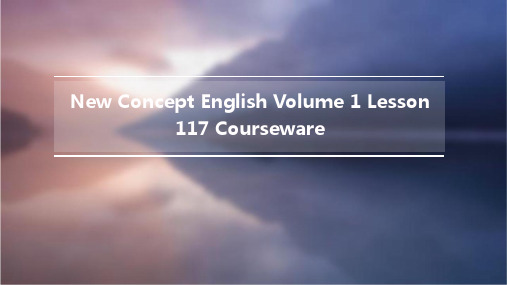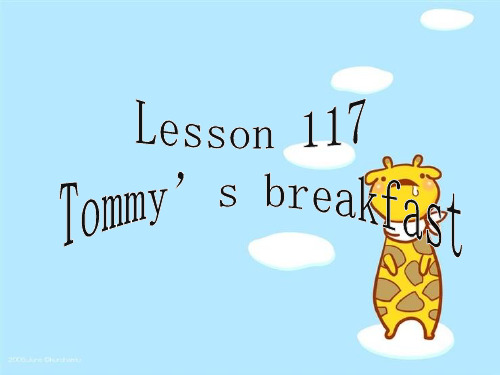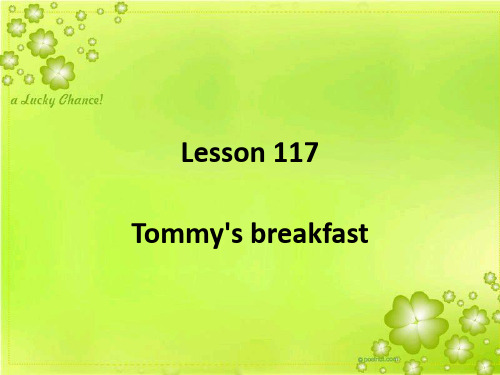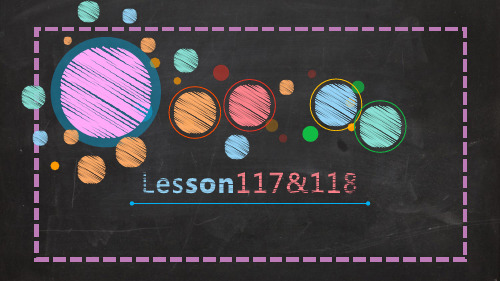新概念英语第一册117课课件45358教学教材
合集下载
新概念英语第一册117课课件

reinforces the importance of learning English.
Words and expressions
The text includes a variety of useful vocabulary and expressions related to learning English.
04
reading comprehension
Reading materials
Text
"The Olympic Games"
Background information
The history and development of the Olympic Games, the significance of the Games in modern society, and the role of the Olympics in promoting global peace and friendship.
Some examples of words and expressions are: "global language," "interconnected world," "essential," "communication," "learning curve," "fluency," "conversational skills."
01
Sorting out the content of the text
Topic of the text
The topic of the text is about the importance of learning English.
Words and expressions
The text includes a variety of useful vocabulary and expressions related to learning English.
04
reading comprehension
Reading materials
Text
"The Olympic Games"
Background information
The history and development of the Olympic Games, the significance of the Games in modern society, and the role of the Olympics in promoting global peace and friendship.
Some examples of words and expressions are: "global language," "interconnected world," "essential," "communication," "learning curve," "fluency," "conversational skills."
01
Sorting out the content of the text
Topic of the text
The topic of the text is about the importance of learning English.
新概念英语第一册117课 课件(共17张PPT)

• 4. The boss arrived when she was typing a letter.
• 5. The train left when I was buying the tickets.
• 6. It rained heavily when I was driving to London.
A. is having B. have C. has D. was having
4. What ____ you ____from 7 to 9 yesterday ? A. were, doing B. did. do C. have, done
5.Look! Lily with her sister __ a kite on the playground.
shaving
cut
Exercise P239
• 1. He knocked at the door when I was answering the phone.
• 2. He came downstairs when I was having breakfast.
• 3. The phone rang when I was washing the dishes.
过去进行时VS现在进行时
结构
现在am/is/are+v-ing 过去was/were+v-ing
The students are drawing pictures now.
The students were drawing pictures when the teacher came in.
3.时间状语:
New words and expressions
dining room
• 5. The train left when I was buying the tickets.
• 6. It rained heavily when I was driving to London.
A. is having B. have C. has D. was having
4. What ____ you ____from 7 to 9 yesterday ? A. were, doing B. did. do C. have, done
5.Look! Lily with her sister __ a kite on the playground.
shaving
cut
Exercise P239
• 1. He knocked at the door when I was answering the phone.
• 2. He came downstairs when I was having breakfast.
• 3. The phone rang when I was washing the dishes.
过去进行时VS现在进行时
结构
现在am/is/are+v-ing 过去was/were+v-ing
The students are drawing pictures now.
The students were drawing pictures when the teacher came in.
3.时间状语:
New words and expressions
dining room
新概念英语第一册第117-118课课件

mouth n. 嘴
• • • • • • • • Open your mouth. 嘴里塞满食物时不要说话。 Don’t talk with your mouth full! It sounds funny in your mouth. 这种话由你的口中说出来,听起来就很可笑 a useless mouth光吃不做的人, 饭桶 a big mouth[美俚]碎嘴子; 说话冒失的人; 爱吹牛, 说大话的人 Tom was born with a silver [golden] spoon in his mouth.汤姆生 于富贵之家。 • from hand to mouth 勉强糊口 • from mouth to mouth口口相传的
• He put them both into his mouth. We both tried to get the coins. But it was too late. Tommy had already swallowed them! • put sth +介词短语 把…东西放在… • 把书放在桌子上 • Put the books on the desk. • both表示“两个都…” • 他们俩都想去法国。 • They both want to go to France. • 三者或三者以上用all • 他们大家都幸福 • They were all happy.
• • • • • •
• • • • •
2.表示过去某一阶段一直在进行的动作。 他们昨天在等你。 They were waiting for yesterday. 她去年在写一部小说。 She was writing a story last year. 3.表示从过去某一个时间的角度看将要发生的 动作,用于某些瞬间动作;go, come, leave, stay, fly 等。 几天后他们要离开。 They are leaving in a few days. They were leaving a few days later. 他告诉我他的哥哥要到苏州去。 He told me that his brother was going to Suzhou.
新概念英语第一册第117-118课课件

1. 过去进行时的肯定式: 主语+was/were + 动词的现在分词
2. 过去进行时的否定式: 主语+was/were not +动词的现在分词
3. 过去进行时的疑问式: Was/Were + 主语+ 动词的现在分词?
肯定句:We were having supper when the phone rang.
Chinese Breakfast
油条 水饺 蒸饺 馒头 饭团 蛋饼 豆浆 稀饭 白饭 蛋炒饭 米粉 馄饨面 酸辣汤
fried bread stick boiled dumplings steamed dumplings steamed buns rice and vegetable roll egg cakes soybean milk rice porridge plain white rice fried rice with egg rice noodles wonton & noodles hot and sour soup
★ toilet n. 厕所,盥洗室
bathroom/washroom/ restroom
lavatory/'lævətəri/
public conveniences 委婉用语(英)
comfort station
ቤተ መጻሕፍቲ ባይዱ
委婉用语(美)
Water Closet (wc) 委婉用语(欧)
toilet paper/ toilet roll 卫生纸
from hand to mouth
勉强糊口
from mouth to mouth
口口相传的
have a big mouth
新概念英语第一册第117课(课堂PPT)

16
117课 过去进行时练习: 一、仿照例句用所给 的词汇造句。
1. I, see him, he, cross the street I saw hi m while he was crossing the street. (He was crossing the street when I saw him.) A. the sun, shine, we, come out B. she, study at college, the war, break out C. she, work in a factory, the city, be liberate d (放) D. he, lose his pen, he, go sightseeing in th e city
17
1. While we __________ (wait) for the bus, a girl __________ (run
) up to us.
2. I __________ (telephone) a friend when Bob __________ (com
e) in.
3. Jim __________ (jump) on the bus as it __________ (move) aw
1
阅读课文回答问题
What does the she mean by ‘change’ in the last sentence ?
2
再看一遍课文
3
When my husband was going into the dining room this morning
4
he dropped some coins on the floor.
117课 过去进行时练习: 一、仿照例句用所给 的词汇造句。
1. I, see him, he, cross the street I saw hi m while he was crossing the street. (He was crossing the street when I saw him.) A. the sun, shine, we, come out B. she, study at college, the war, break out C. she, work in a factory, the city, be liberate d (放) D. he, lose his pen, he, go sightseeing in th e city
17
1. While we __________ (wait) for the bus, a girl __________ (run
) up to us.
2. I __________ (telephone) a friend when Bob __________ (com
e) in.
3. Jim __________ (jump) on the bus as it __________ (move) aw
1
阅读课文回答问题
What does the she mean by ‘change’ in the last sentence ?
2
再看一遍课文
3
When my husband was going into the dining room this morning
4
he dropped some coins on the floor.
新概念英语第一册第117-118课件

n. 嘴
Open your mouth.
张开(zhānɡ kāi)你的嘴。
Shut your mouth.
闭嘴〔口〕
face, eyebrows, eye, nose, ear, mouth
from hand to mouth 勉强糊口
from mouth to mouth 口口相传的
have a big mouth
arrived. v 当他刮胡子的时候,他伤到他自己了。 v He cut himself while he was shaving. v 当我妻子在做饭的时候,我在花园里工作。 v My wife was cooking the dinner while I was
working in the garden.
第十一页,共36页。
Key words and expressions
• 三天后 • 回头见,再见 • 早晚,总有一天 • 他比平常(píngcháng)
来得晚
• three days later • see you later • sooner or later • He came later than
Pay a person back in his own coin. 以其人之道还治其人之身。 你能把这个一美元的纸币换成硬币吗?
Could you change the one-dollar note into coins?
第九页,共36页。
Key words and expressions
★ mouth
v
v 这个箱子太重,我搬不动。 v The box is too heavy for me to carry.
第十五页,共36页。
新概念英语第一册第117课完整ppt课件

精选ppt
阅读课文回答问题
What does the she mean by ‘change’ in the last sentence ?
精选ppt
再看一遍课文
精选ppt
When my husband was going into the dining room this morning
精选ppt
续的或同时发生的,那么主从句的动词都可用过去
进行时。
精选ppt
本课语法过去进行时
1.过去进行时由“主语+was/were+动词ing”构成 2.过去进行时的否定式由“主语+was/werenot+现 在分词”构成 3.过去进行时的疑问式由“was/were+主语+现在 分词”组成 句型 肯定句=主语+was/were+doing+其它 否定句=主语+was/were+not+doing+其它 一般疑问句问语=Was/Were+主语+doing+其它 答语:Yes,Iwas/were.或No,Iwasn't/were’t. 特殊疑问句=特殊疑问词精+选p一pt 般疑问句+其它
精选ppt
本课语法
1.look for,寻找(强调动作过程);find,找到(强调寻找的结 果)。 2.Tommy had already swallowed them! 汤米已经把硬币咽了下去 句中用了过去完成时形式 had swallowed。过去完成时用来表示过去 两个动作中发生在前的那个动作。显然,句中咽下硬币的动作发生在 夫妇俩能够把硬币从汤米手中抢过来之前。 3.later that morning,那天上午的晚些时候。 later是副词late的比较级。 4.any change change是个多义词,既有“零钱”的意思,也有“变化”的意思。此 处既可指“硬币”;也可指“情况的变化”。这是双关(pun /p)n/) 修辞法。
阅读课文回答问题
What does the she mean by ‘change’ in the last sentence ?
精选ppt
再看一遍课文
精选ppt
When my husband was going into the dining room this morning
精选ppt
续的或同时发生的,那么主从句的动词都可用过去
进行时。
精选ppt
本课语法过去进行时
1.过去进行时由“主语+was/were+动词ing”构成 2.过去进行时的否定式由“主语+was/werenot+现 在分词”构成 3.过去进行时的疑问式由“was/were+主语+现在 分词”组成 句型 肯定句=主语+was/were+doing+其它 否定句=主语+was/were+not+doing+其它 一般疑问句问语=Was/Were+主语+doing+其它 答语:Yes,Iwas/were.或No,Iwasn't/were’t. 特殊疑问句=特殊疑问词精+选p一pt 般疑问句+其它
精选ppt
本课语法
1.look for,寻找(强调动作过程);find,找到(强调寻找的结 果)。 2.Tommy had already swallowed them! 汤米已经把硬币咽了下去 句中用了过去完成时形式 had swallowed。过去完成时用来表示过去 两个动作中发生在前的那个动作。显然,句中咽下硬币的动作发生在 夫妇俩能够把硬币从汤米手中抢过来之前。 3.later that morning,那天上午的晚些时候。 later是副词late的比较级。 4.any change change是个多义词,既有“零钱”的意思,也有“变化”的意思。此 处既可指“硬币”;也可指“情况的变化”。这是双关(pun /p)n/) 修辞法。
相关主题
- 1、下载文档前请自行甄别文档内容的完整性,平台不提供额外的编辑、内容补充、找答案等附加服务。
- 2、"仅部分预览"的文档,不可在线预览部分如存在完整性等问题,可反馈申请退款(可完整预览的文档不适用该条件!)。
- 3、如文档侵犯您的权益,请联系客服反馈,我们会尽快为您处理(人工客服工作时间:9:00-18:30)。
在分词
Theyห้องสมุดไป่ตู้were not watching TV. 3、疑问句:was/were + 主语+ 现在
分词
Was he writing a letter last night?
❖ 常用时间状语
When, while, a moment ago, from nine to ten last evening, at that time ❖ when既指时间点,也可指一段时间, while只指 一段时间,因此when引导的时间状语从句中 的动词可以是终止性动词,也可以是延续性动 词,而while从句中的动词必须是延续性动词。
o’clock last night.
Practice Time!
1. While she ___ TV, Penny ___ asleep.
A. watches, was falling B. was watching, fell C.was watching, was falling D. watch, fell KEY: B
7. Mike and I___(play) basketball at that time yesterday afternoon.
课文讲解
❖ When my husband was going into the dining room this morning, he dropped some coins on the floor.
❖ There were coins everywhere. We looked for them, but we could not find them all.
❖ everywhere 到处 ❖ look for 寻找(强调动作和过程) ❖ find 找到 (强调寻找的结果) ❖ 我找遍了任何地方都找不到我的钢笔。
❖ 此句是过去进行时,结构是was/ were+ doing 表 示过去某个时刻正在进行或发生的动作。
❖ go into 走进,强调“进入”的动作 ❖ 反义词 go out of 走出… ❖ drop 掉下 ❖ 小心,别把花瓶摔了。
Be careful! Don’t drop the vase. ❖ drop 还可以表示丢失,丢掉 ❖ 回家的路上,我把等弄丢了。
沧海一粟;九牛一毛。
Time for listening!
❖ 概念:
1、在过去某个特定的时间正在进 行或发生的动作。
2、当过去的一个动作发生的时候 另外一个动作正在进行。
❖ 结构 1、肯定句:主语+was/were + 现在
分词
I was having breakfast. 2、否定句:主语+was/were not +现
Dining room(hall) 饭厅
Living room
起居室,客厅
Bedroom 卧室
Bathroom
洗浴室,卫生间
Kitchen
厨房
❖coin n. 硬币(可数名词)
e.g. Every coin has two sides.
每个事物都有两面性。
❖ mouth n. 嘴
e.g. Don’t talk with your mouth full!
❖ 过去进行时与一般过去时 ❖ 过去进行时强调过程,不一定完成 ❖ 一般过去时强调事件,一定完成 ❖ I went to school yesterday. ❖ I was going to school at that time. ❖ Tom did his homework last week. ❖ Tom was doing his homework at nine
4. I ___ (telephone) a friend when Bob ___ (come) in.
5. While mother ___(put)
Cathy to bed, the door bell ___
(ring).
6. Jane___(wait) for me when I___(arrive).
I was having dinner when he came in.
He came in when I was having dinner
While I was having dinner, he came in.
Mom was reading while Dad was watching TV.
嘴里塞满食物时不要说话。
❖ swallow v. ① v. 吞下,咽下
Tommy swallowed the coins.
② v. 吞并;侵吞
Our company was swallowed up by an company last year.
我们公司去年被一家美国公司吞并了。
American
❖ later 1) adv. 后来,较迟地,较后地 e.g. three days later 三天后
New concept English 1
Lesson 117
Tommy's breakfast 汤米的早餐
New words and expressions
❖ dinning room
❖ coin
n.
❖ mouth
n.
❖ swallow v.
❖ later
adv.
❖ toilet
n.
饭厅 硬币 嘴 吞下 后来 厕所,换洗室
e.g. He came later than usual. 他比平常来得晚。
2)adj. 较迟的,较后的,更近的。 e.g. Let’s take a later train. 我们搭晚一点的火车吧。
❖ drop v. (意外)掉落;使掉落 e.g. A drop in the bucket/ocean.
❖ I looked for my pen everywhere, but I couldn’t find it.
2. Penny __ dinner when she cut her fingers.
A. had B. having C. was having D. is having KEY: C
3. While we ___ (wait) for the bus, a girl ___(run) up to us.
Theyห้องสมุดไป่ตู้were not watching TV. 3、疑问句:was/were + 主语+ 现在
分词
Was he writing a letter last night?
❖ 常用时间状语
When, while, a moment ago, from nine to ten last evening, at that time ❖ when既指时间点,也可指一段时间, while只指 一段时间,因此when引导的时间状语从句中 的动词可以是终止性动词,也可以是延续性动 词,而while从句中的动词必须是延续性动词。
o’clock last night.
Practice Time!
1. While she ___ TV, Penny ___ asleep.
A. watches, was falling B. was watching, fell C.was watching, was falling D. watch, fell KEY: B
7. Mike and I___(play) basketball at that time yesterday afternoon.
课文讲解
❖ When my husband was going into the dining room this morning, he dropped some coins on the floor.
❖ There were coins everywhere. We looked for them, but we could not find them all.
❖ everywhere 到处 ❖ look for 寻找(强调动作和过程) ❖ find 找到 (强调寻找的结果) ❖ 我找遍了任何地方都找不到我的钢笔。
❖ 此句是过去进行时,结构是was/ were+ doing 表 示过去某个时刻正在进行或发生的动作。
❖ go into 走进,强调“进入”的动作 ❖ 反义词 go out of 走出… ❖ drop 掉下 ❖ 小心,别把花瓶摔了。
Be careful! Don’t drop the vase. ❖ drop 还可以表示丢失,丢掉 ❖ 回家的路上,我把等弄丢了。
沧海一粟;九牛一毛。
Time for listening!
❖ 概念:
1、在过去某个特定的时间正在进 行或发生的动作。
2、当过去的一个动作发生的时候 另外一个动作正在进行。
❖ 结构 1、肯定句:主语+was/were + 现在
分词
I was having breakfast. 2、否定句:主语+was/were not +现
Dining room(hall) 饭厅
Living room
起居室,客厅
Bedroom 卧室
Bathroom
洗浴室,卫生间
Kitchen
厨房
❖coin n. 硬币(可数名词)
e.g. Every coin has two sides.
每个事物都有两面性。
❖ mouth n. 嘴
e.g. Don’t talk with your mouth full!
❖ 过去进行时与一般过去时 ❖ 过去进行时强调过程,不一定完成 ❖ 一般过去时强调事件,一定完成 ❖ I went to school yesterday. ❖ I was going to school at that time. ❖ Tom did his homework last week. ❖ Tom was doing his homework at nine
4. I ___ (telephone) a friend when Bob ___ (come) in.
5. While mother ___(put)
Cathy to bed, the door bell ___
(ring).
6. Jane___(wait) for me when I___(arrive).
I was having dinner when he came in.
He came in when I was having dinner
While I was having dinner, he came in.
Mom was reading while Dad was watching TV.
嘴里塞满食物时不要说话。
❖ swallow v. ① v. 吞下,咽下
Tommy swallowed the coins.
② v. 吞并;侵吞
Our company was swallowed up by an company last year.
我们公司去年被一家美国公司吞并了。
American
❖ later 1) adv. 后来,较迟地,较后地 e.g. three days later 三天后
New concept English 1
Lesson 117
Tommy's breakfast 汤米的早餐
New words and expressions
❖ dinning room
❖ coin
n.
❖ mouth
n.
❖ swallow v.
❖ later
adv.
❖ toilet
n.
饭厅 硬币 嘴 吞下 后来 厕所,换洗室
e.g. He came later than usual. 他比平常来得晚。
2)adj. 较迟的,较后的,更近的。 e.g. Let’s take a later train. 我们搭晚一点的火车吧。
❖ drop v. (意外)掉落;使掉落 e.g. A drop in the bucket/ocean.
❖ I looked for my pen everywhere, but I couldn’t find it.
2. Penny __ dinner when she cut her fingers.
A. had B. having C. was having D. is having KEY: C
3. While we ___ (wait) for the bus, a girl ___(run) up to us.
